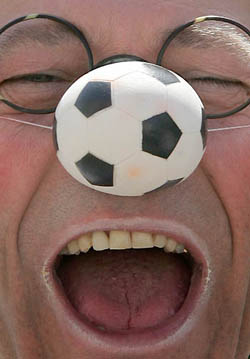Fans may drink to make up for not playing
(Reuters)
Updated: 2006-06-08 09:23 World Cup fever is sure to
bring scenes of rowdy fan behavior fueled by alcohol -- which, it seems, may be
triggered by feelings of inadequacy.
A UK study of men's health and masculinity hints that young men who don't
play soccer or other contact sports may seek that "tough guy" feeling by downing
a six-pack or two during the game.

A German soccer fan
wears a football-design attachment on his nose in Frankfurt ahead of the
start of the 2006 World Cup.
[Reuters] | Psychology researchers who conducted
in-depth interviews with 31 young men in the 18-to-21 age range from a variety
of socioeconomic and ethnic backgrounds found that men may use one type of
typically masculine behavior to compensate for another.
"For example, men who are not confident in their sporting abilities may try
and make up for this by drinking excessively," said Dr. Richard de Visser from
the University of Sussex who led the research, which was sponsored by the
Economic and Social Research Council.
The aim of their research, de Visser told Reuters Health, is to look at "how
men actively construct a masculine identity via healthy and unhealthy
behaviors."
"Rather than masculinity being a singular thing," de Visser reported, "there
are a variety of ways of being masculine, and a range of ways that men test and
demonstrate their masculinity -- some of these are healthy (e.g., sports) and
some are not (e.g., excessive drinking, risk taking, etc.)"
There isn't "a simple link between masculinity and unhealthy behavior. It all
depends on how men use their masculinity," de Visser said.
The study also found that men can use credit in one masculine domain to
resist pressure to engage in other masculine behaviors. For example, "good
sportsmen said that they were able to resist pressure to drink or drink
excessively," according to de Visser.
"The flip side of this is that men who feel that they are not masculine could
use unhealthy behaviors like drinking to gain 'masculine' credit," he added.
Encouraging men to engage in healthy masculine behaviors, de Visser predicts,
will reduce a perceived need to engage in unhealthy masculine behavior, which
may have help curb anti-social behavior among young men such as binge-drinking,
violence and illicit drug-use.
The full results of the study are due to be published later this year.
|